An Unusual Angle Read online
Published by
Norstrilia Press
PO Box 91
Carlton, Victoria 3053
Australia
First published 1983
Copyright © Greg Egan 1983
This book is copyright. Apart from any fair dealing as permitted under the Copyright Act, no part may be reproduced by any process without permission.
Enquiries should be addressed to the publisher.
Published with the assistance of the Literature Board of the Australia Council.
National Library of Australia
Cataloguing-in-Publication data
Egan, Greg, 1961-
An unusual angle.
ISBN 0 909106 11 8 cloth
0 909106 12 6 paper
I. Title.
A823'.3
Typeset by Norstrilia Press.
Printed by Globe Press, Brunswick.
Cover by Cozzolino Hughes.
Chapter 1
ESTABLISHING SHOTS
Walking the sun-sleepy suburban streets, it seems like I have all the time in the world.
That’s a dangerous illusion!
Any minute now the school will come into view, and I still don’t know how I will respond to it, how I will deal with it, how I will portray it (let alone how it will respond to, deal with (and portray?) me). Any minute now I’ll turn a corner, someone will shout ‘Action!’ and that will be it, no rehearsals, no re-takes; our first encounter recorded forever, so much could depend on it.
Nothing will depend on it. What melodramatic crap!
I’ll track-in from darkness, that’s a good way to start; isolate the school in a frame of blackness, cutting out all distractions. And then what? It’s too late to make more plans, here comes the vital (fatal (unexceptional)) corner.
A white rabbit with a sense of occasion sneaks in front of me just in time, and slams a clapper-board. There’s no need for it at all, my synch is guaranteed by other means, but it’s a touching gesture, before:
Darkness.
Darkness glows deep blue at first, encouragement from earliest childhood (stay in touch!) warming away some of the tingling extremities of fear and excitement.
Closer to the school, a sickly yellow-green stains through, polluting everything. Enough to make me want to turn and run, but turning won’t shift that pale smear from centre field, running will only bring it closer.
I distract myself with technicalities: why black is never truly black (no silver in my head, alack!) but the school will not stop oozing its horrible pus all over the frame. Why can’t it stay decently isolated by a tunnel of clean darkness?
This isn’t turning out (does anything, ever?).
I drop the device, dissolve the perfect, mind-painted matte, let in once more the blue sky and the sunny street. See at once that this is better, not letting that perfectly ordinary building up ahead dominate disproportionately. Keep it unremarkable, almost unnoticeable the way its trees match those on verges nearby.
Just part of the scenery.
What happened, what went wrong? With the warm roads and silent houses eclipsed, it seemed so smug and so strong.
I try to blot out everything but one single drowsy old dwelling (to see if it will become magically endowed with power, with smirking, sneaky strength) but I can’t seem to obscure the school at all, and I can’t concentrate on the edges of the house, so I give up.
Best to keep my eyes right open. I never know what’s about to happen.
Splash.
ADSUMMUM COLLEGE announce raised green letters glued to creamy white with brushstrokes and even a few hairs. Painted by multifunctioned caretakers or cheap professional painters? Why call them hairs when they are surely not but probably rather synthetic fibres? Hairs of a hundred years ago haunt us still.
Go in by front (formal (firm foundations (fighting for freedom))) entrance, even though some are crossing the unoval oval and using side entrances. I must be careful. A new start and all but one wrong step is all it takes.
All what takes?
Suppress it: static. A clear mind and a heavy body.
Creamy white everywhere, the same streaky standard. Rooms formed in squares, all doors facing inwards. Labouring the point, if you ask (but who would?). With those oh so narrow exits, what if there’s a fire? If those oh so strong doors (no cardboard sets here) were closed and bolted?
Three touching squares, or a long rectangle cut by two parallel lines. On ground level: administration at the front, toilets on the first line, canteen on the second line, storage rooms at the far end. Make the shape out of matchsticks. At every corner there is an opening to the outside which can be sealed by heavy double doors swinging in, thick brass bolts burrowing deep into the concrete floor and ceiling. Elsewhere on the ground level, and everywhere upstairs: paint scratched and peeling off sliding doors into sweaty-chalked blackboard classrooms. Operating theatres.
And yes, the look smells like a hospital, all that white frightening.
Rude belch of static from all directions and many distances. There must be sixty, perhaps one hundred loudspeakers. From what I can see at least one at each corner fixed to the upstairs railing, and surely one in every classroom.
Nothing follows.
Looking around about it seems that first years predominate, but that is only an illusion, they would of course stick out being nervous and unfamiliar, while all others would be almost invisibly at ease, walking and talking in the manner of walls and pillars (and who has ever seen walls or pillars walk?).
—Not I!
said the rabbit, darting between my feet then stopping stock still to support the ceiling.
One year even would be so much, with a grid of reference points against which to measure the fall into the future. Such a temptation to simply let go, to drop for five years, but then looking back for support (structure (scale)) I would find only void (and who would wish for that?).
—Not I!
said the rabbit, flying over my head and far away.
Many first years have clotted neatly: safety in numbers and all that. I pivot (not really, but a nice pretence): I suppose I could join, but I am not prepared for the sacrifices, even considering the isolation otherwise. I mean, think of the binding energy! I am happiest as a charge-neutral, colour-neutral, massless member of another species entirely (my wave function unmixed with others’), wandering about using, of course, real tracking shots and never ever zooming.
The front square is half concreted and half jungle with a tiny lake. The middle square is all concrete, the last is neatly mown grass (not jungle; an irritating almost-regularity). Seek symmetry in all things, says a voice within me, but I do have so many voices within me.
Again the sound of electronic indigestion but this time a grey, nervous voice follows uncertainly:
—Would all students move to the Western Quadrangle, now, please. All students to the Western Quadrangle for a brief assembly before sorting into forms.
Such a mundane voice, such a mundane message. The white paint turns to dust and blows away with an odour of antiseptic, revealing faded blue doors and red brick walls, and a sign reading FENKIRK VALE SENIOR HIGH SCHOOL. How embarrassing! I’d hoped to keep a small illusion of exoticism going for a day or two, just a change in surface details leaving structures intact, but the tone of that dreary voice bled away my strength of purpose.
So, who cares? I don’t need it. I just believe that life benefits from the occasional touch-up, a little contrast enhancement here and there. It’s hard enough to tell the days apart that if you don’t take steps to make small excitements larger it’s like coming off the assembly line time after time (and who can live like that?).
—Not I!
said the rabbit, one of thousands millin
g about me.
Besides, I had nowhere to go with the white-painted Latin-named boarding school. Clinical eeriness is all very well, but it would have ended unpleasantly with someone stuffing cotton wool down my throat and giving me the last rites, or perhaps it would have just faded weakly away. Better this way, with the lump of a fantasy’s sudden demise as the first reference point of my new grid.
I have forgotten which way is westwards but I follow the obvious stream as the communal mind cannot be wrong about west, surely. I am led to the square of grass.
It is hot, I am just beginning to feel, not through the air around but straight from the sun, radiation rather than conduction because it is still early and the air is relatively cool, I suppose. I move into the shade of the canteen.
At the end of the square of grass is a concrete stage with all three sides long concrete steps. A microphone on a stand is there and a cord snakes to a socket on the wall behind. The wall is one piece with a roof corrugated in metre-wide triangles, which comes forward a little over the stage but mainly extends back to be flush with the level of the upstairs balcony but separated by the railing. Behind the back wall of the stage, beneath the corrugated roof, is an empty space for canteen queues on bitumenised ground.
A wave of sitting spreads across us and I comply, not wishing to be accused of propagating a disturbance.
Propagating an acceptance is different.
Betrayal one. Who cares? Shut up.
A tall, thin, balding, black-haired, green-eyed, worried man walks up to the microphone. He is Deputy Headmaster Mr Callow and in a few minutes the Principal, Mr Seward, will be along to talk with us, he says.
With us. Sure.
Odd, that, calling himself Depty Headmaster and then presaging the Principal. Surely you must have a Deputy Headmaster and a Headmaster, or a Deputy Principal and a Principal? Perhaps it’s a new compromise between the new and old waves of administrators in the Education Department, coming to grips at last with important issues.
Silence is awkward and unstable and soon collapses into the lower-energy state of a murmur (after emitting a photon). Poor Mr Callow looks unhappy and nervous and strained. I nearly talk to him, nearly tell him that a few mumbling voices are nothing to be concerned about (but I restrain myself, as it would only have made him feel worse).
And then it happens.
Total silence.
(Except for crickets and other small insects buzzing and chirping loudly, taking advantage of the lack of competition. The grass smells, but does not look, like it has been mown only seconds ago. The heat makes it smell.
Then even the insects are quiet.)
He is tall, broad but not fat, with a lot of red hair that is not very long. His eyes are blue and his face is very white. His head is very large. He looks about fifty. He strides up the stairs along the side of the stage with bitter enthusiasm.
I have viewpoints in place, and I start up ‘Thus Spake Zarathustra’ on the soundtrack as the picture cuts between his feet on the stairs, a head-on view from the opposite side of the stage, and a highly magnified shot of a swollen red sun rising over the sea.
He walks over to the microphone stand with wide, arrogant steps, then stands in front of it, saying I do not need this electronic crutch when I can project my wonderful, deep, resonant voice across a million parsecs.
And then he begins to speak, projecting his wonderful, deep, resonant voice across a million parsecs.
He talks with his hands thrust so deeply into the trouser pockets of his dark blue suit that the upper part of his body is in grave danger of overbalancing him and throwing him head-first down the steps. But no, he does not stay like this. Like some strange gyroscope he balances by means of motion, regularly bending at the waist, pushing back his torso and pushing forward his stomach and pelvis, also pivoting at the ankles. These stabilising motions usually last about two seconds, and take place every eight seconds.
—Well, kids, this is my first year at Fenkirk Vale. From what I hear, it’s been a pretty good school up until now, but I hope that you’re going to help me to make it a whole lot better!
The sun stands still above us, slashing time with a wound which he is free to tear open to any width he chooses. Words flow down onto the grass like an irritating warm-dropped rain: a nuisance, but not enough to make me run for cover. A few plucky students take thoughtful-mother-provided cyanide pills and die in paroxysms on the grass, which makes Deputy Something Mr Callow look a little ruffled, but otherwise who cares? I feel a warm, lazy confidence: I can ignore this crap for five years, it’s easy. Just keep silent, face in roughly the right direction, and switch off inside.
But I monitor his rantings at reduced volume. Why? Just In Case.
Every now and then comes a Joke. For this, he locks his entire body very firmly in the bent-forward position, opens his mouth wide, and shakes his head back and forth like a carnival clown waiting for a ball down its throat. The Joke ends very quickly with no audience laughter to reinforce it, and the normal pattern is resumed.
Glasses on a beaded chain fly erratically on and off his nose, and the creeping crimson, the rapid reddening of his face: this is not cyclic, but increasing continually.
And then he stops.
Deciding quite arbitrarily that he has finished, he just strides off sullenly. Unbelievably, a dozen students begin to clap. He stops no pauses says:
—Now, no need to clap, this isn’t entertainment!
and is gone.
I review my coverage of the event, experiment a little with different combinations of the rising sun and the ascending Seward: superimposing the two, matting-in the sun behind him, and a few more complex procedures, like taking Seward’s image and producing a matte which is opaque outside his figure and within his figure is dense in proportion to the magnitude of the gradient of the density of the original shot, and printing the shot of the sunrise through this matte onto the original shot, thus creating a glowing red Seward walking up the stairs, but preserving enough of his features to prevent him turning into a mere patch of light. I’m rather proud of it.
Of course the critics would be all petulant and cross over the use of ‘Zarathustra’ as they think it belongs solely to 2001 and they don’t have the imagination to appreciate its use anywhere else. They would entirely miss the point: sure, it’s become a cliché since 2001 but that only helps to strengthen the irony of any mock-climax which it underscores. They drive me crazy, the slimy, stupid parasites, squirming and puffing about trying to force every film they see to fit in with their private obsessions and theories and prejudices, and then clumsily mocking those which will not be twisted into the shapes they desire, deriding film-makers when they break conventions, sneering at them when they use them well, gloating over financial failures, indignant over financial successes. And the public solemnly swallow their bitter, frustrated rantings, the fools.
‘Zarathustra’ stays. Not that anyone will ever know.
Sallow Callow steps forward from his hiding place and holds the microphone stand nervously, perhaps afraid to speak after such a demonstration of brute eloquence.
He chants solemnly:
—The mass is ended, go forth in peace.
Only kidding. The insects, too. They didn’t go quiet.
—First years move to the hall for sorting into forms. Second years move to the end of the quadrangle. Third years move out onto the oval. Fourth and fifth years to the, ah, southern lawn. I’ll just repeat that.
Which he did.
And we move, leaving the corpses to fertilise the lawn.
I film this through a viewpoint with a very wide angle, starting the shot looking down from the balcony at the far end of the quadrangle and gradually moving the viewpoint both upwards and eastwards, tipping the line of sight slowly towards vertically downwards. The students look like ants in a maze, but who ever puts ants in mazes?
I kill the viewpoint before the school is seen embedded in the suburb; there’s something I don’t l
ike about that composition.
The hall is lined with gymnasium equipment, and then with us. A frail, dark-haired woman reads out the names in each form, and I am in One F. Oh good, that’s my identity crisis solved.
Quick cut-away: a punched card drops into a slot.
No, overused. Perhaps an ion hits a photographic plate in a mass spectrometer?
Both images are wrong, for both imply sorting according to characteristics. A hand of cards being dealt, then? To whom? To the form teacher, of course, but are we even concerned with the form teacher? Who will relate to the cards?
—Cut out the crap!
calls the rabbit with the Vote For Mailer placard.
Our very own form room, and when we arrive there, we are given government-issue paper and pens. Our form teacher then describes our timetables to us as if slowly communicating via radio telescope with strange and distant beings in a pared-down language capable of expressing only the simplest ideas. The salivating frustration of the information rate is enough to anger me into thinking about ripping the whole thing, gestalt-wise, out of his brain. Only thinking. Of course. I fantasise about him floating around the school perched on a tiny lump of rock wearing a headset and pointing a parabolic antenna at passing people, who all walk by too quickly for him to even discover their names.
Hours pass in the form room with nothing happening, so I make a quick state-of-the-moment documentary: form teacher’s name is Mr Nigel, a thirtyish Social Studies teacher with a walrus-like moustache and a generally drooping countenance. Our form room is the second of two classrooms in the shiny, glassy, new library built with Federal Funds (although the ordinality is quite arbitrary as the building is quite symmetric and the classrooms indistinguishable; I wonder (deeply) about the agony of that initial decision as to which room would be called the ‘first’).
I survey the students, plot their parameters on a multi-dimensional scatter diagram. All parameters have very small variances. The mean boy is wearing green-striped tennis shoes, blue jeans, and a yellow tee-shirt. His hair is light brown and his eyes are green. The mean girl is wearing brown sandals with short white socks, a green skirt, a green blouse, and a pink and white cardigan. Her hair is dark brown and reaches half-way to her waist, but is not plaited. Her eyes are light brown.

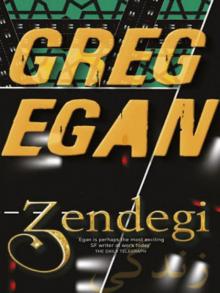 Zendegi
Zendegi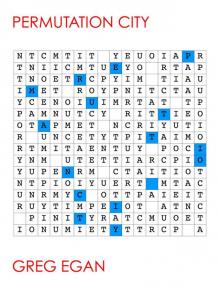 Permutation City
Permutation City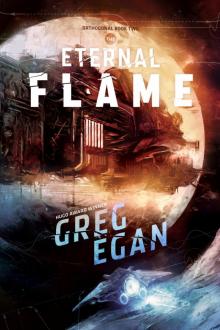 The Eternal Flame
The Eternal Flame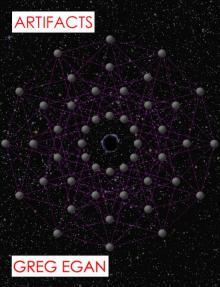 Artifacts
Artifacts Wang's Carpets
Wang's Carpets Dichronauts
Dichronauts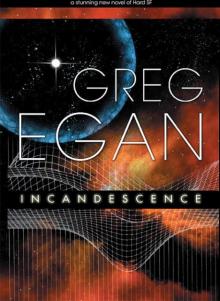 Incandescence
Incandescence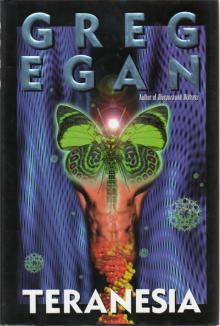 Teranesia
Teranesia Schild's Ladder
Schild's Ladder Quarantine
Quarantine The Four Thousand, the Eight Hundred
The Four Thousand, the Eight Hundred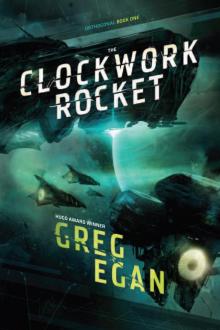 The Clockwork Rocket
The Clockwork Rocket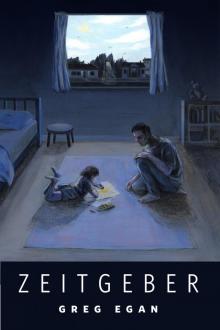 Zeitgeber
Zeitgeber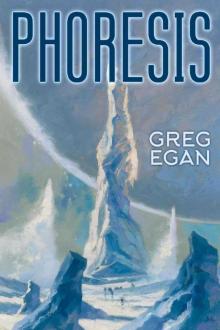 Phoresis
Phoresis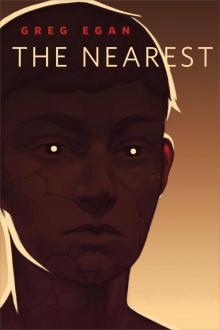 The Nearest
The Nearest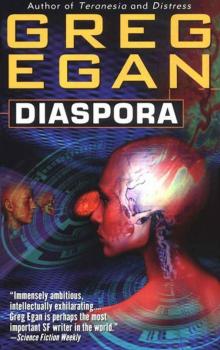 Diaspora
Diaspora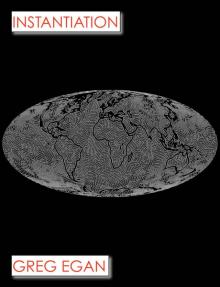 Instantiation
Instantiation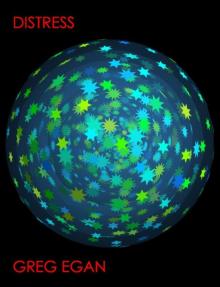 Distress
Distress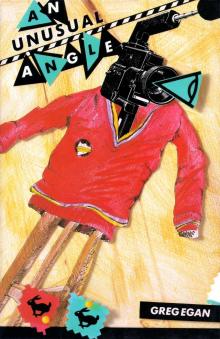 An Unusual Angle
An Unusual Angle Oceanic
Oceanic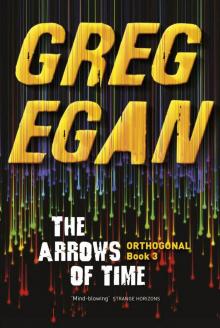 The Arrows of Time
The Arrows of Time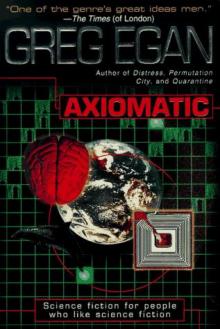 Axiomatic
Axiomatic![Anthology 2. Luminous [1998, 2010] Read online](http://i1.bookreadfree.com/i/03/18/anthology_2_luminous_1998_2010_preview.jpg) Anthology 2. Luminous [1998, 2010]
Anthology 2. Luminous [1998, 2010]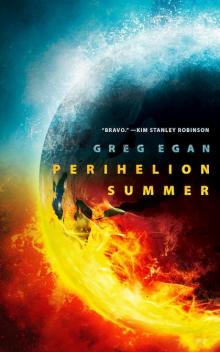 Perihelion Summer
Perihelion Summer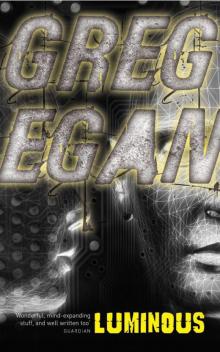 Luminous
Luminous